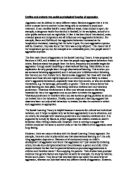To satisfy the first part of the M’Naghten rules, “Defect of reason” it must be proved that the accused powers of reasoning are, or were at the time of the Act impaired. In Clarke it was shown that mere absent-mindedness does not amount to insanity. This could be seen as being fair and just. The law on insanity only applies to those who are deprived of their powers of reasoning and not to those who fail to use them. This area of the law is arguable in a satisfactory state.
The second aspect of the M’Naghten rules is however more complex. The term “disease of the mind” is a legal term not a medical one it covers any mental illness or physical disease which affects the operation of the mind. The M’Naghten rules are over a hundred and fifty years old and seen by some as being outdated. Society has changed significantly, in particular in its regard to mental illness since this time. Cases such as Kemp and Hennessy have caused controversy and are viewed by many as highly unsatisfactory. In these cases the defendants were suffering from physical illnesses – arteriosclerosis and diabetes retrospectively. The offences the defendants were charged with occurred during either a loss of consciousness or hyperglycaemic episode. In both cases the defendants were found not guilty by reason of insanity. The term “Insane” has a great amount of stigma attached to it. Many would argue that it is unsatisfactory for the law to label defendants with physical disabilities or conditions as being insane. Perhaps a defence of automatism would be more appropriate in such situations. This was argued by Kemp but was rejected in favour of insanity. When writing about the M’Naghten rules, the academic Morris described the rigid definition of insanity as being, “woolly, semantically confused and psychologically immature nonsense.” Many would argue that this area of the defence is in desperate need of reform. Charities such as MIND have campaigned to change the law so that physical illnesses, such as epilepsy, are no longer classed as a “disease of the mind”. However the reform which arose from the enactment of the Criminal Procedure Act 1991 has helped this issue as it is now unlikely that a defendant suffering from epilepsy or a similar condition who receives the special verdict will be given a hospital order. Another criticism of the M’Naghten rules is that it does not provide a defence if the accused knows that the nature and quality of the act and that it is legally wrong (Windle) but suffers from a mental illness causing delusion which lead him to believe the act was morally right, this too would appear unsatisfactory.
In the case of Quick (1973) the Court of Appeal adopted the external factor theory. This was first used in New Zealand in the case of Cottle. The basis of this theory is that internal factors, such as mental or physical illness amount can amount to a plea of insanity, otherwise known as insane automatism. On the other hand external factors, such as alcohol or medication can amount to a defence of automatism. Over-reliance on the external factor theory can produce bizarre outcomes such as in Hennessey, which is discussed above.
Another area of insanity in possible need of reform is to clarify the issue of sleepwalking. This can amount to insanity as in the case of Burgess, yet in the case of Bratty a definition was given of automatism and was taken to include sleepwalking. There are however many satisfactory areas of the law on insanity. It is a very workable defence; it is fair for example in that it requires evidence from at least two medical experts. Although he criticised the defence in terms of the M’Naghten rules being outdated, Morris also commented that, “as a means whereby juries work rough justice in a difficult peripheral area of law and morality they are reasonably satisfactory.
In conclusion the statement describing the law on insanity as being in an unsatisfactory state could be argued. Although the area needs small reforms, in particular regarding the definition of “disease of the mind” in reference to physical illness, the majority of the law on the defence is in a satisfactory state. The 1991 reforms following the Criminal Procedure (Insanity and Unfitness to Plead) Act 1991 have corrected the error of hospitalising defendants who do not require psychiatric treatment and would never be medically classed as insane.







